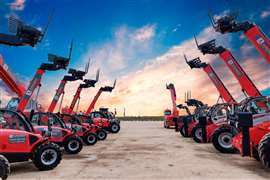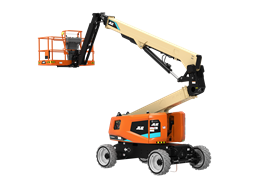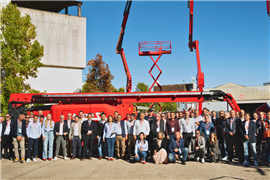Read this article in Français Deutsch Italiano Português Español
Italy’s rental market influenced by history and opportunity
31 July 2024
Italy offers one of the world’s largest manufacturing bases for access equipment, and is home to a diverse rental sector - often specializing in niche or lower volume equipment.
As with most European countries, Italy has a complex set of market dynamics. Unlike many of the others, however, the outlook is positive, with caveats.
Speaking at the European Rental Association (ERA) Conference in May, Martin Seban, director of KPMG, a global audit, tax, and advisory firm, downgraded forecasts in several countries across the continent for 2024 but noted that Spain and Italy have maintained steady investment levels due to EU financial support, with projected growth of 5.5% and 3.5% respectively next year.
These forecasts build on an equally strong performance last year in Italy, according to research by the Committee for European Construction Equipment (CECE), which shows that in 2023 construction investment grew by 5% overall, with positive growth across all sectors. Public non-residential construction was even better at 18% growth. However, housebuilding investment showed the most modest increase at 0.7%, compared to 2022.
As previously mentioned, it’s a complicated landscape. A new report from trade Italian association Unacea, in partnership with the economic research institute Centro Europa Ricerche (CER), forecasts a downward trend in certain segments of the construction sector, although it is expected to remain robust overall.
While 2023 saw a slight decline of 3.1% for construction machinery sales, compared to the previous year, said Unacea, it was still 47% higher compared to the volumes five years earlier.
Consolidation with a focus on specialization
Like many countries with a longstanding, localized rental culture, there is growing consolidation in the rental market through acquisition. National rental company Mollo Noleggio has continued its expansion in the country with the acquisition of aerials renter Tecnostrutture in Fombio, Lombardy.
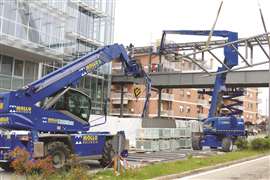 Mollo lifts carry out bridge erection.
Mollo lifts carry out bridge erection.
The purchase is the first Mollo has made in 2024, having added a number of companies to its portfolio last year, bringing its total number of depots to 50. Mauro Mollo, president of the Mollo Group, said, “We want to continue growing by acquiring specialized rental companies deeply rooted in their territory.”
However, while larger companies look to expand through acquisition, there are also a growing number of these small, very specialized rental companies concentrated in specific fields, such as telecommunication tower maintenance.
Paola Palazzani, president of Italy-based spider lift manufacturer Palazzani, confirms the situation. “There are two kinds of rental companies [in Italy] - one is the big generalists, where there’s a machine for everybody.
“The second type is the specialist service provider. They are rental companies, but they are very different from what we think about rental companies. They have specialized tools for their needs and maybe two big spiders.”
It is this latter sector – the niche all-in-one provider - that is seeing huge growth potential for companies like Palazzani.
Italy is not just a major producer of equipment for homegrown OEMs but is the chosen location for international companies too. Genie, for example, has committed to its presence in the country with its longstanding plant in Umbertide. It supplies Europe and North America, among other regions, and has confirmed that it is set to increase its telehandler manufacturing capacities there.
Infrastructure fuels expansion
Infrastructure is also a significant long-term objective in the country. Italy’s own Webuild consortium has long been in in the wings to build what will be the world’s longest suspension bridge, spanning the Stretto di Messina between Sicily and the Italian mainland.
The Eurolink consortium, led by Webuild, won a bid to build the bridge back in 2005. Italy’s new prime minister Giorgia Meloni said he now backs the project and it looks set to move forward in coming months.
Expansion in Italy is part of Mollo’s continued aim with new depots and acquisitions, which started in 2021 with Monia Noleggi in Forlì, followed by Parmiani Noleggi in Valtellina, PMP in Udine, Manetta Noleggi in
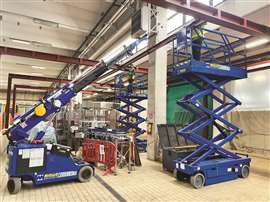 A busy indoor steel erection job for Mollo.
A busy indoor steel erection job for Mollo.
Teramo, Edilservice in Siena and most recently, in Mrach this year Tecnostrutture, which is based in Lodi.
Mollo’s fleet consists of over 13,000 aerial platforms, cranes and general rental equipment, including truck-mounted up to 75m working height, self-propelled and vertical platforms, spiders, fixed and rotating telehandlers, as well as cranes and other generalist construction rental equipment. On the aerials side the company also offers rental with an operator.
The company’s 60 rental depots are located in nine regions and 36 Italian provinces, serving customers throughout Italy and abroad, and 550 employees.
Mauro Mollo says the company will continue on the investment path. “This year we will continue to increase and renew our fleet of vehicles and as always we will select them among the most reliable and innovative manufacturers on the world market.”
In the two-year period from 2024-2025 the expected investment in new machines will be €120 million.
That will include the evolution of its Blue & Green transition program, which was formed in 2017 with the aim of growing reduced consumption and emission friendly equipment. In the future purchasing choices will be increasingly towards vehicles with electric and hybrid technologies and Euro 6 and Stage V engines.
Of course, there are always challenges, as Mollo points out, “In Italy the increasing inflation and interest rates has caused a general increase in costs for companies.
“As a result, we have got increase in insolvent customers and greater difficulty in collecting their payments.”
The struggle for profitability
On top of that, rental rates are uneven, with the focus having become too much on price. “These policies risk damage to the entire sector,” Mollo says.
“There is a requirement to shift the focus of the competition away from price, for example, to the range of products and services offered, on the quality of the service and on professionalism.
“A fair market price will guarantee that professional operators can maintain a high quality of service,” Mollo says.
However, Italy has faired better in the post pandemic years, compared to European nations in the north of the continent.
In the post-pandemic years, state benefits in Italy - first and foremost the 110% bonus - have generated a real boom in the rental sector, says Mollo.
“The end of these incentives led to an easily predictable slowdown after the peaks they had produced, Mollo says, adding, “Despite this, the rental of equipment is still progressing at a good pace, thanks above all to the investments planned in public works financed by the PNRR.”
Consequently, Mollo forecasts a positive few years ahead, “provided that no further sudden unforeseen events occur on the international economic scenario.
“In a market that continues to grow and becomes increasingly demanding in terms of the quality of the service offered, the issue of ‘staff’ within companies is fundamental.”
The greatest opportunities are linked to sectors in which rental still has strong development potential, in particular the industrial and infrastructure sectors.
Unfortunately, the tendency for many rental companies is still often to serve the customer at all costs and to chase profits to the detriment of quality and safety.
“Hirers should ensure that vehicles arrive on site in a safe and well-maintained way,” Mollo states. “However, there are still renters who continue to use very old and/or poorly maintained machines, placing the users of these vehicles under unacceptable dangerous conditions.
“The rental sector will require stricter rules and more frequent checks.”
Market stabilization
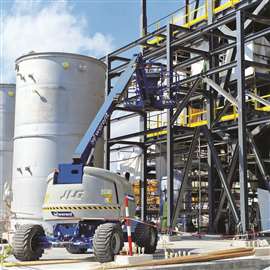 Werent caries out more steel erection work, this time in an industrial setting.
Werent caries out more steel erection work, this time in an industrial setting.
According to Werent, following exponential growth of previous years, this year the rental market in Italy has stabilized.
The company has a fleet of more than 400 vehicle-mounted platforms, in a total of over 2,000 units. They include a range of truck mounts up to 103m, telehandlers up to 23 tonnes, by bridge platforms up to 20m, and scissor lifts up to 26m, boom lifts up to 58m, as well as forklifts, mobile cranes, earthmoving machines, lighting towers and generators.
The company has six offices in Italy but operates throughout Europe. “We are planning to open new branches in the Veneto region, an area in which Werent has been able to conquer an important market share in just a few years.”
After the general growth phase in the construction industry in recent years, there is now talk of “normalization,” said the company.
This, the company added, is a “positive sign of a more mature and stable market, where excessive fluctuations are decreasing.
“It’s a natural step after a period of exceptional growth. The margins for growth are still wide, but further growth will necessarily have to come from the professionalization of operators and targeted training for new people entering this sector.”
Investments in equipment this year will reach approximately €20 million which will strengthen the rental fleet by €3 million in value ahead of the opening of the new branch in Veneto.
“The Italian economy is certainly growing and will be so for the next five years, thanks to the availability that Europe is bringing into play to guarantee continuous and uninterrupted development.”
Rental rates are constantly increasing due to the increase in the cost of machines. The forecast is that there will be a further increase in rental rates, which will then stabilize, unless there are unexpected external
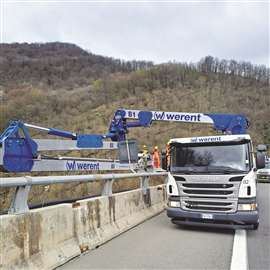 A Barin underbridge unit belong to Werent at Appennino Tosco-Emiliano National Park.
A Barin underbridge unit belong to Werent at Appennino Tosco-Emiliano National Park.
factors.
“The only counter dynamic that rental is experiencing,” says the company, “is the lack of specialized and non-specialized personnel.
“Companies to have to make much more effort to guarantee the quality of the service, which must be very high to continue to make people perceive the importance of rental and of all the work that is behind it.
The rental trend of electric excavators and electric telescopic handlers is constantly increasing. Furthermore, a type of machine that is increasingly in demand is that of crawler mini-cranes.
“Investing in green technologies is an integral part of our strategy to satisfy every construction site need and, above all, reduce the impact of our business on the environment.”
STAY CONNECTED



Receive the information you need when you need it through our world-leading magazines, newsletters and daily briefings.
CONNECT WITH THE TEAM










